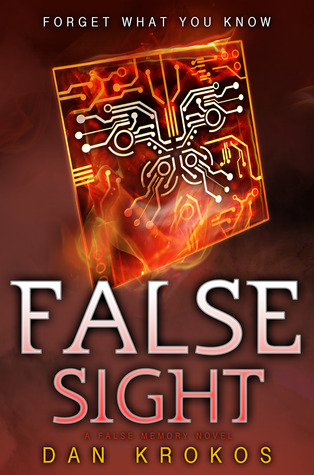 False Sight
False SightDan Krokos
Series: False Memory, # 2
Genre: Young Adult, Science Fiction, Fantasy
Rating: 3.5 out of 5 stars
Word Rating: Clipping
Goodreads | Amazon | Book Depository
If you're like me, then Dan Krokos hooked you with False Memory, and he hooked you bad.
The end of False Memory left us with startling facts: the creators are clones, the Miranda that we thought was Alpha team's Miranda isn't Miranda (???), Olive's dead as nails - and the list goes on.
Krokos's mastery of suspension, action, and depth left me hungry for more (maybe I was just hungry because I read it all at once for four hours I don't know) and so I dived right into False Sight, expecting answers to my questions.
And I got them.
And I'm not entirely sure I like them.
What makes the first book so incredible is that the Sci-Fi element is coupled with the fact that Miranda is not a reliable narrator. This means that Krokos can only push the Sci-Fi element so far, leaving most of the twists and turns to hinge on Miranda's POV and her amnesia. It's an easy plot device as well as an interesting narration to comb through. The farthest the Sci-Fi is pushed is to a clone lab and hints at some kind of animalistic, probably genetically-engineered monsters. And this is great, because it keeps the reader grounded in the present day. The plot unfolds with twists that screw with Miranda's psyche, like the fact that she's a super weapon, rather than twisting with events.
In contrast, as you may be guessing, the second book is not like this. By this time, Miranda knows (generally) who she is, and Krokos takes this chance to pour out the entire mythology of his books in around 200 pages. It's kind of scary, and a little absurd.
Here's a rough overview:
Miranda and the Roses are blending in at a school until they learn more about the creators. Someone in their crew is killed when another one goes rogue. Miranda downloads the dead Rose's memory. They follow the rouge, and end up in another universe? Now the dead Rose is alive in her head??? Wait but let's get back to the alternate universe for a second, where did this come from -- oh wait, here's an apocalypse tale for you and monsters and a mythical device called a Torch and the secrets of the entire universe of this trilogy in three pages okay bye. And then chaos ensues.
This is at once, kind of frigging incredible. At first, it seems like these events were simply bad choreography but we learn later on that Krokos isn't just a mad man. The events that twist and turn fit tightly together in the plot line and make sense on an overall scale. At the same time, however, it's very disruptive to the characters. For example, Miranda spends a lot of the book worrying about whether she will turn rogue like the other rogue, thinking that she cannot be trusted whatsoever. This is fine, but it also puts a stopper on the wounds and traumas from the last book, not allowing the characters to consider much of them. Character depth is limited to Peter being distant, Rhys being generally two-dimensional now, Miranda being confused and not trusting herself, etc. It seems like a cheap trick to allow for another book, simply to have resolutions of character. In addition, there are parts of the book that are completely unnecessary in an already insane plot. For example, when Miranda finally has the Torch at the end, she tries to use its power to travel between universes. For some reason this doesn't work, and Krokos has someone attack her from a portal, which she jumps into. This is unnecessary action and twisting when there has been non stop fighting for this object through three universes. Miranda just jumped out of a car for frigg's sake.
Anyway, if you've gotten past my wall of text, then you might be put off by False Sight. But that was just a warning, albeit a long and detailed one.
In its other aspects, especially the style of writing, Krokos is somehow more enticing than he is in the first novel. The phraseology is simply gorgeous at times.
I love, love, love the fact that the dead Rose is inside Miranda because almost all of the character depth comes from this fact. It allows Miranda the kind of above-three-dimensional feeling she had in the first book because she speaks for this consciousness, talks and touches this consciousness inside her. It's simply a fascinating aspect of the book.
As usual, Krokos never holds back in his action scenes, brilliantly describing precisely the proper way to kick someone with a chair and roll away standing.
I won't go on. Main point is, if you were hooked by False Memory, you will most likely love False Sight, though you might question whether a slightly more linear plot line would have helped.
What's the limit to plot absurdity?
Let us know in the comments!
Let us know in the comments!

No comments:
Post a Comment